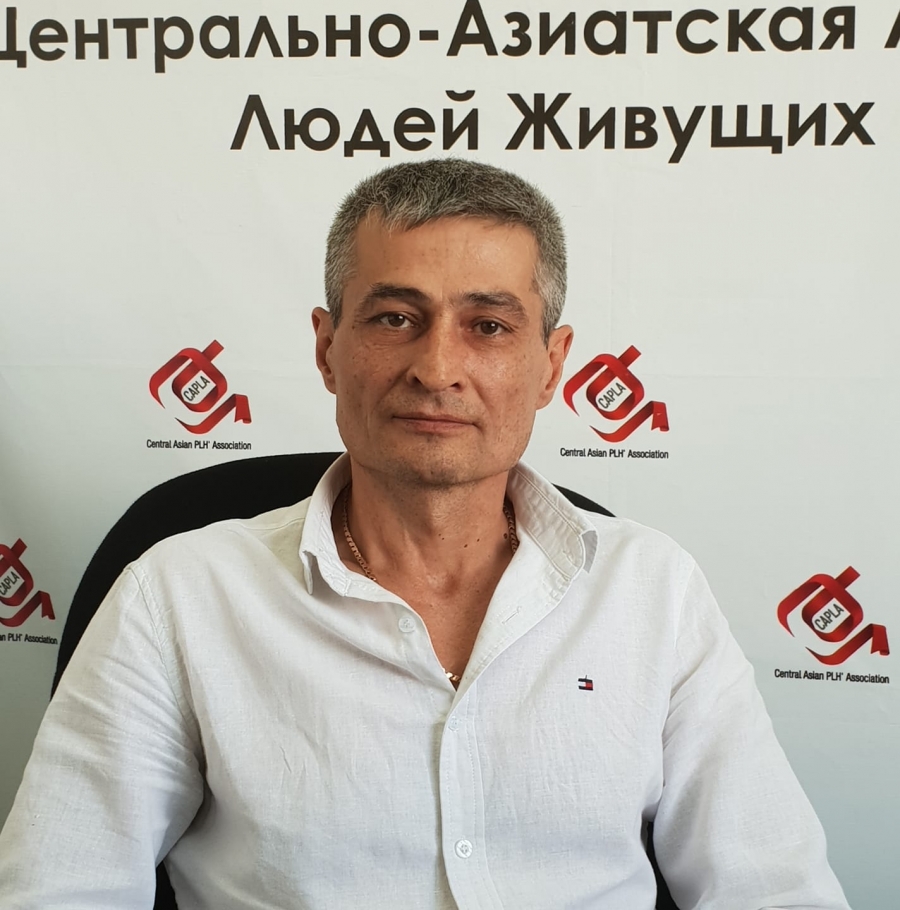Head of Central Asian Association of People Living with HIV talks about everyday difficulties HIV-positive migrants face.
Nurali Amanjolov knows everything about life obstacles of HIV-positive people in Central Asia. He comes from Temirtau, which has a high HIV prevalence rate. In his hometown, Nurali was the head of a civic foundation named Shapagat. In 2005, he moved to Almaty and created Kazakhstan Union of People Living with HIV, and in 2009, together with his partners from Kyrgyzstan, Tajikistan, and Uzbekistan, he founded the Central Asian Association of People Living with HIV.
CENTRAL ASIA AND KAZAKHSTAN
It is difficult to isolate country-specific troubles for HIV-positive migrants among the countries of Central Asia, as there are not many migrants who come to our offices in Kyrgyzstan or Tajikistan. There are very few such people in these countries, and they are completely accompanied by non-governmental organizations.
In Kazakhstan, more than 200 HIV-positive people are undocumented migrants (this refers to the number of people who have come to the Association — editor’s note). One of the problems is that, officially, these people do not exist and do not form a part of official government statistics. Currently, the Code of Healthcare includes help for only HIV-positive citizens and oralmans* (currently, instead of “oralman” (repatriate), the term “kandas” (fellow-countryman) is being used — editor’s note).
ANTIRETROVIRAL THERAPY IN CENTRAL ASIA
Central Asia is a place where the Global Fund operates. Its important advantage is that it provides antiretroviral therapy (ART) to all who need it, irrespective of their citizenship. It purchases medications for patients in Tajikistan, Uzbekistan, and Kyrgyzstan. The latter two countries are also planning a transition to purchasing medications on a republican level. Today, only a small part of medications is purchased by the governments; less than 10%, but this is a step towards the fulfillment of obligations owed to the people who live with HIV.
Kazakhstan is the only Central Asian country which purchases the treatment without external help. The resources of the Global Fund include a small sum for Kazakhstan, for about 170 undocumented people. It is said in the Code, that ART is provided to Kazakhstan citizens and “kandas” for free. Thus, the rest have a right to buy these medications. But the logistics is not well calculated: these drugs cannot be bought in a pharmacy or through a doctor. This is where non-governmental organizations and societies may help.
Since 2011, the Central Asian Association of People Living with HIV has been purchasing ART for migrants by any means, including directly from pharmaceutical companies or using intermediaries in Russia or Ukraine. Once, the drugs were brought from Thailand, thanks to Pacific chain of People Living with HIV.
But things have been changing for the better. Earlier, if a HIV-positive foreign citizen was imprisoned in Kazakhstan, they were unable to receive ART. Nevertheless, for such a person, the jail or prison is their place of constant living. The penitentiary system and Human Rights Bureau have supported our petition on including all imprisoned people into the list of the treatment recipients. Now, all HIV-positive people of any citizenship in penitentiary receive ART.
MULTIFACETED SUPPORT IN KAZAKHSTAN
The Human Rights Bureau together with the Ministry of Home Affairs has started a program of identifying and legalizing undocumented people. The program has been prolonged until May 2021, but it will probably be protracted. Using this partnership, we try to provide migrants with multifaceted support: consulting, legal and social accompaniment, treatment provision.
International projects in Kazakhstan are usually pretty small; just parts of international missions. Our society tries to provide support based on a person’s needs. We collaborate not only with the Ministry of Home Affairs and the Human Rights Bureau, but also with private lawyers and non-governmental organizations. We have 14 organizations who work in Kazakhstan. There is a white spot in the western part of the country, in Aktau and Atyrau, but there are only about 10 to 12 people there in need of such help, and they have adapted socially and only need ART.
STIGMATIZING PEOPLE LIVING WITH HIV
Migrants with HIV face stigma for being migrants and having HIV. Currently, there is less stigmatization than before, and it usually comes from the elderly. Younger people are better informed and less prejudiced. I believe this stigma will die with my generation. Largely, it came in existence due to headlines about the AIDS as the plague of the 20th/21st century and alike.
A separate medical service for HIV-infected persons in Central Asian countries contributes to this stigma. In developed countries, there are no HIV-specific clinics; there are infectious disease hospitals which provide follow-up for HIV-positive people. We ask everyone to join a global campaign against all forms of stigma and discrimination related to HIV. You can join the #morethan hashtag in social media.
ADAPTATION OF PEOPLE LIVING WITH HIV
Self-stigmatization is significant in the lives of people living with HIV. A self-confident person does not need external support. I was such a person when I became familiar with my HIV status 22 years ago, and I am still such a person, but many people are different.
Usually, HIV-positive migrants’ behavior follows a specific scenario: a person seeks help once, receives a negative answer due to their status, and does not try any more. We are certainly saying that today HIV is a controllable chronic disease, but this is not understood by everyone.
The importance of the Association is that it consists of people affected by HIV, who know existing issues from inside. In Kazakhstan, which is a country of emigration as well as immigration, our organization plays a very important role for HIV-positive people.
Glossary
*Oralman (literally repatriate) — ethnic Kazakhs and their family members who return to Kazakhstan from Russia and several Asian countries (Uzbekistan, Turkmenistan, Kyrgyzstan, China, Mongolia, Iran, Afganistan, Pakistan, etc.). Since 2021, these people are being called kandas (fellow-countrymen/women).
Author: Nadezhda Rogozina
This article was prepared with the support of Oxfam in the Russian Federation
